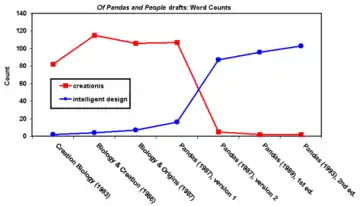Edwards v. Aguillard
Edwards v. Aguillard was a case heard by the Supreme Court of the United States in 1987. The Court ruled that a Louisiana law requiring that creation science be taught in public schools alongside evolution was unconstitutional, because the law was specifically intended to advance a particular religion. At the same time, however, it held that "teaching a variety of scientific theories about the origins of humankind to school children might be validly done with the clear secular intent of enhancing the effectiveness of science instruction."
| The divine comedy Creationism |
| Running gags |
| Jokes aside |
| Blooper reel |
|
v - t - e |
Stevens and "Academic Freedom"
During the Supreme Court oral argument (former) Justice John Paul Stevens challenged the assertion by creation science defender Wendell Bird that the purpose of the statute was to promote academic freedom: "May I ask about academic freedom for a moment? Would you say it would advance academic freedom if the school was told you cannot teach a student German unless he's also willing to study French?" Bird eventually replied after trying to avoid the question several times "Yes, it would", claiming the purpose was "a basic concept of fairness, teaching all the evidence."[1][2]
Reactions by the creationists

In the creationist textbook Of Pandas and People, the occurrence of the phrases "creationism" and "intelligent design" drastically changed around 1987, some time right after the trial[3].
The creationists didn't keep records properly, and thus the missing link was discovered between intelligent design and creation science. This sealed the fate of creation science intelligent design in Kitzmiller v. Dover Area School District.
See also
External links
References
- David G. Savage, Turning Right: The Making of the Rehnquist Supreme Court
- Oral Argument Transcript
- See from 57:20-1:00:45 in this video on youtube: Ken Miller on Intelligent Design